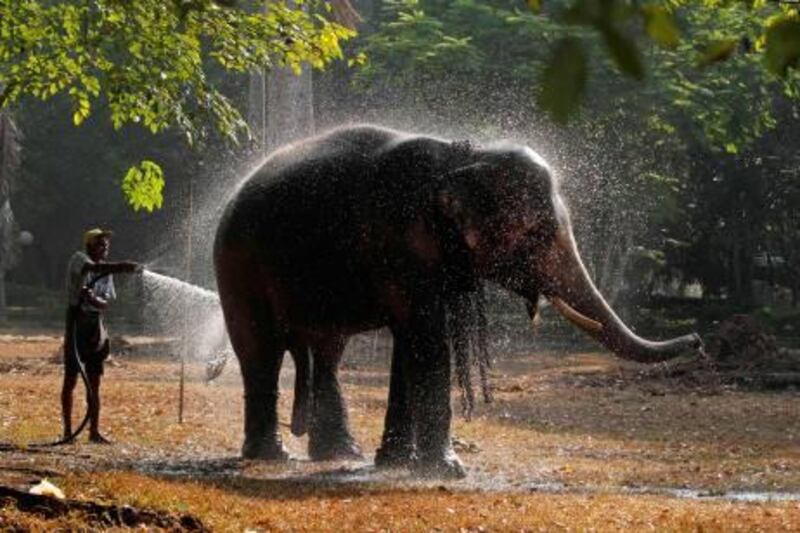Forty-three stressed-out elephants are frolicking and taking it easy at a spa. They are there to soothe their bodies and minds.
These elephants - hired out to Hindu temples to lend majesty to religious ceremonies - are at Mudmalai Wildlife Sanctuary in the southern state of Tamil Nadu. They have been sent there by the government to relax for six sybaritic weeks because of their gruelling jobs.
For the elephants, the relief must be immense. In their work in cities such as Chennai, the state capital, they have to contend with traffic, congestion and teeming crowds trying to touch them amid the ghastly explosions of firecrackers. At the sanctuary, the forest is green and tranquil and there is plenty of lovely food and special treats - big fat cakes of unrefined sugar known as jaggery - on offer.
Elephants are an important part of Hindu temple rituals, not just in Tamil Nadu but in the neighbouring state of Kerala especially, and in the whole of south India. They can have a working life of three to four decades. Of late, such has been their popularity that even mosques and churches have started hiring elephants for special functions.
Kerala has 900 elephants. Some have been stripped of their nobility and turned into beasts of burden by their owners, worked endlessly and hired out to temples.
The job is tough. During ceremonies, they stand in the scorching heat for hours on end. Apart from the physical exhaustion, there is the mental strain caused by unruly crowds. "Some of them end up as nervous wrecks from the noise and chaos," said Vivek Menon, the executive director of the Wildlife Trust of India.
But the lucky ones frolicking at Mudmalai have six weeks of pampering ahead. "On arrival, they were weighed and we'll keep weighing them regularly because we want them all, particularly the lean ones, to go back to work fattened up and glowing with health and vitality," said the park's deputy director, Ameer Haja.
They first undergo a medical check-up, crucial because hardly any vets in south India know how to treat an elephant. Also, they could treating a dozen dogs in the time it would take to treat a single pachyderm.
Once the team of doctors at the sanctuary has assessed an elephant's condition - the feet are a big concern as often they are sore and blistered - the spa regimen is prescribed:
Ÿ A bath in the river morning and evening by two mahouts (elephant keepers)
Ÿ Daily massages with gigantic pumice stones and coconut husks to keep their blood circulation healthy
Ÿ Ayurvedic tonics to tone their bodies
Ÿ 300-400kg or more every day of green fodder including palms, leaves, grass, sugar cane and sorghum
Ÿ Treats in the form of 50kg of cooked rice mixed with jaggery, coconut and turmeric, with multivitamins mixed in
Ÿ Regular walks to tone up limbs made stiff from being tied to a temple post
"They also get a chance to socialise with other elephants, which they never do otherwise. So far, they are having a ball," said Haja.
These jumbos are the lucky ones. Old elephants are often neglected by their owners, underfed with ailments left untreated because of the cost. One elephant will eat about 400kg a day and the cost of the food, combined with the salaries of three mahouts and medical care, can add up to Dh2,300 a month in a country where the average monthly salary is about Dh250.
"There is a saying that if you want to harm your enemy, give him an elephant because it will bankrupt him," said Chenoy Balakrishnan, an elephant owner in Kochi, Kerala, who regards his animals, Chandrashekhar, 55, and Srinivasan, 42, as members of his family.
As an elephant adviser to the temples in Kochi, Balakrishnan advises them to ensure that their animals work only an eight-hour day with breaks in between and to avoid the searing midday sun. Some respect these guidelines; others do not.
Yet some help is at hand. India's first old-age home for elephants opened a few years ago in a tranquil forest at Kottur, Kerala, where retired elephants can spend their twilight years in dignity. Last year, Kerala's minister for forests, KB Ganesh Kumar, promised to set up a hospital exclusively for elephants.
Balakrishnan is happy that the Tamil Nadu elephants are being pampered but says his "boys" do not need a spa because they are well looked after and never overworked.
Balakrishnan has seen old traditions die out. In the old days, he says, even a mahout, out of respect for the nobility of his animal, would approach it only after formally asking its permission.
"These days, that reverence is missing. They are majestic creatures but crowds are not even aware that they are insulting him when they touch his tusk. It's like pushing the turban off a man's head," he said.
Follow us on Twitter and keep up to date with the latest in arts and lifestyle news at twitter.com/LifeNationalUAE





